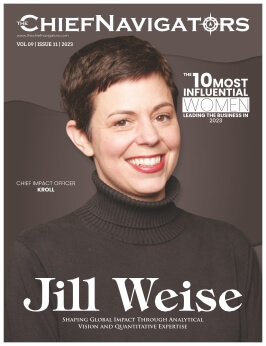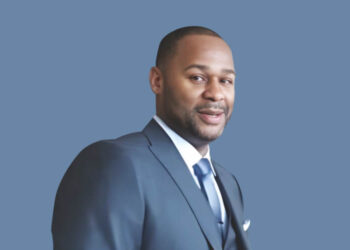Jill Weise: Shaping Global Impact Through Analytical Vision and Quantitative Expertise
The 10 Most Influential Women Leading the Business in 2023

The dynamic realm of business demands nimble strategic leadership and a profound grasp of environmental, social, and governance (ESG) endeavors. At the forefront of this global shift stands Jill Weise, the Chief Impact Officer of Kroll. Armed with a comprehensive portfolio, Jill oversees vital aspects such as corporate values, leadership development, succession planning, employee and community relations, and philanthropy through the prestigious Kroll Charitable Foundation. With her unwavering commitment, Jill plays a pivotal role in shaping Kroll’s impactful strategy and ensuring its successful implementation.
While Jill’s educational background is mostly in economics and mathematics, she believes that these fields have provided her with the logical frameworks required to confront the multi-layered difficulties that arise in today’s corporate scene. Jill’s expertise in microeconomics has polished her analytical thinking and given her a powerful toolkit to solve a wide range of situations, armed with a deep understanding of economic theory and game theory.
Jill’s ability to combine highly quantitative methodologies with a larger societal viewpoint has been helpful throughout her professional career. Jill’s analytical skills have constantly resulted in unique solutions, whether she is delving into detailed economic models or managing difficult company challenges. Her schooling not only gave her a thorough comprehension of economic concepts, but it also instilled in her a strong sense of logical thought processes.
Despite her seemingly unusual career path from economics to Chief Impact Officer, Jill is fully committed to her work, realizing the enormous value her quantitative rigor brings to the table. By seamlessly merging her educational foundations with her innate passion for making a positive difference, Jill Weise exemplifies how analytical vision and logical reasoning can shape the course of global impact in the business realm.
From Consulting Expertise to Making a Positive Impact within Kroll
Jill has been a part of Kroll since 2012, back when the firm was known as Duff & Phelps. She has worked with the company for over a decade, although her career started much earlier. She formerly worked for a boutique consulting firm that was later acquired by Duff & Phelps. In essence, she has worked with her current employer since 2008, during which time she has gained tremendous experience and longevity.
Jill’s expertise has centered around a specific sector known as transfer pricing throughout her professional career. This specialty focuses on assessing and addressing international tax issues related to intercompany transactions. Her primary responsibilities included working in a consultancy setting, supporting clients in managing difficult tax challenges and identifying opportunities. It takes a thorough grasp of client difficulties, as well as using her skill set and the expertise of colleagues, to assist clients in finding solutions or optimizing their potential.
Jill believes that her consulting experience has been extremely beneficial in her present role as the firm’s Chief Impact Officer. For starters, her comprehensive knowledge of the organization garnered from her years of work gives her unique insights into its growth and operations. She has built strong ties with colleagues all throughout the world, helping her to grasp their skills and experiences.
Now, considering the firm itself as her client, Jill practices the same principles she used in external consulting. She categorizes the needs and opportunities within the company and then draws upon her experience, as well as the collective knowledge of the firm, to make a meaningful impact. This shift from external consulting to an internal focus aligns with her new role as the Chief Impact Officer.
Before assuming her current position, Jill held various leadership roles within the firm. She served as the global head of the transfer pricing practice, where she was responsible for overseeing and guiding the team’s activities worldwide. Prior to that, she was the North American head of the same practice. Her prior work in the big four accounting environment also added to her knowledge and understanding of comparable services.
Jill realized the value of different activities aimed at developing the company’s identity as a corporate citizen in the world after spending significant time with the firm and being thoroughly familiar with its management and operations. These initiatives aimed to define the firm’s ideals, objectives, and growth strategies, particularly in regard to its stakeholders, which included the workforce base. Jill used her consulting skills to turn her attention inside, focusing on projects to strengthen the firm and maximize its potential in a variety of areas.
Fostering Partnerships and Creating Value
At the core, Jill recognizes that there are multiple stakeholders involved in the firm’s success. The primary groups include clients, employees, and investors. To understand the firm’s identity, growth, and opportunities, it is crucial to establish strong partnerships with each of these stakeholder groups.
As a consulting-oriented business, Kroll relies heavily on its people and their knowledge and skills. It is essential to invest in their training, provide appropriate mentorship, and retain top talent. Jill aims to create an environment where individuals are motivated to build their careers and where the firm becomes a preferred destination for professionals.
Similarly, when engaging with clients, Kroll must effectively represent its organizational identity and capabilities. The firm strives to present itself as an exciting and trustworthy partner with whom clients are willing to collaborate, connecting their values and ambitions with those of Kroll.
Regarding investor perspectives, the value of the firm lies in the development and retention of exceptional talent, as well as the perception clients have of Kroll. These factors drive investor value, and they are intertwined with the success of the firm.
When Jill assumed the role of chief impact officer, it was a new position with significant potential for shaping its direction. Starting from this premise, she identified areas where Kroll could enhance its efforts to create value for clients and employees. Some of these areas required additional focus beyond the existing infrastructure.
The first set of missions developed by the impact office targeted these crucial areas. They aimed to augment existing functions and initiatives within the firm. The focus areas encompassed further improving mentoring programs, enhancing inclusion and diversity efforts, and cultivating an inclusive corporate culture.
Efforts were made to strengthen mentorship ties, allowing individuals to benefit from the knowledge and direction of seasoned professionals. Additionally, the establishment of an inclusion and diversity function within the firm, headed by a chief inclusion and diversity officer, aimed to build programs focused on inclusive hiring and operational practices.
Jill’s strategic approach involved working on both the people front and fostering an inclusive environment where diverse perspectives and backgrounds are respected and valued. By fostering such an environment, Kroll will be able to attract professionals from diverse backgrounds and benefit from the richness of information and ideas they bring to the table.
Driving Environmental and Social Impact
In terms of environmental efforts, Kroll has been carbon neutral for several years, actively measuring its carbon footprint and implementing strategies to mitigate and offset carbon emissions. The focus is on continuous improvement, which involves developing a comprehensive carbon reduction plan to enhance efficiency and reduce the firm’s carbon impact.
The E of ESG (Environmental, Social, and Governance) initiatives also involve engaging employees through green teams, which are working groups established across the organization. These teams not only aim to make significant changes at the macro level but also focus on day-to-day practices within each office to promote environmental citizenship. This includes practices such as energy-efficient lighting, responsible paper policies, recycling efforts, and community outreach activities like park clean-ups. Engaging employees in these efforts encourages them to become part of the solutions.
One noteworthy initiative is the Sustainability Challenge, where individual offices participate in a friendly competition to reduce their carbon footprints. Employees are given individual tasks to reduce their personal carbon footprints, and the challenge highlights the achievements of different offices worldwide.
The Kroll Forest project is another significant endeavor. A tree forest was established in India, where Kroll has over a thousand employees. Every employee in the firm is given a tree in their name, and new hires receive a tree as part of their onboarding package. This initiative symbolizes the importance of environmental sustainability to the company and fosters a sense of family and growth as the forest expands with the organization.
Moving beyond the environmental aspect, Kroll also focuses on sustainability and governance. The Kroll Foundation, a non-profit organization, plays a pivotal role in making grants, facilitating volunteering opportunities, and offering pro bono work for various
organizations. Volunteering programs, such as Kroll Cares, are conducted throughout the year, allowing employees to contribute their time, resources, and expertise to partner organizations. By actively engaging with communities, the foundation builds deeper connections and supports clients and communities in ways that make a positive impact on the world.
Nurturing a Culture of Creativity and Collaboration
Kroll recognizes that fostering innovation and cultivating a culture of creativity requires various initiatives and approaches. One such approach is the presence of city leaders, individuals located in each city where Kroll has offices. These city leaders focus on community building and supporting employees within their respective cities. By bringing people together from different areas and encouraging brainstorming sessions, Kroll aims to harness the diversity of thought and experience to generate innovative ideas.
The company also organizes designated programs like Director Days, where directors from a specific office come together for off-site programming. These sessions include educational elements, skill-building exercises, team-building activities, and idea generation sessions on a range of topics. Kroll believes that innovation flourishes when individuals are encouraged to think outside the box and collaborate creatively. The company actively seeks opportunities to foster this mindset throughout the organization.
As an acquisitive firm, Kroll ensures the integration of thought leaders from acquired organizations into the broader thought leadership of the company. By tapping into their unique experiences and expertise, Kroll benefits from a diverse range of perspectives, enhancing the collective thought leadership within the organization.
Moreover, Kroll places significant emphasis on thought leadership across the firm. They provide dedicated time, resources, and support for individuals who are experts in their respective fields to be recognized as thought leaders. These individuals are encouraged to contribute to the firm’s collective knowledge and approach problem-solving from their unique perspectives, while also collaborating as a team. The internal think tank, known as the Kroll Institute, serves as a platform to facilitate this process and drive innovation within the organization.
Unlocking Growth and Thriving in Uncertainty
In the business landscape, Jill has always emphasized the importance of staying focused on learning for emerging leaders and those early in their careers. She believes that individuals often become preoccupied with their next steps, such as promotions or different job experiences, that they fail to fully immerse themselves in the present and extract maximum value from their current experiences. Jill encourages individuals not only to strive for excellence in their work but also to actively seek opportunities for learning and growth along the way.
By embracing a mindset of continuous learning, individuals can expand their knowledge and skills, equipping themselves with a diverse range of tools for their professional toolbox. These accumulated capabilities not only enhance their ability to perform their current roles
effectively but also position them for future career advancements and opportunities. Jill advises aspiring leaders to embrace the present moment and engage in active learning, as it will prove invaluable in their professional journeys.
Jill recognizes that the business landscape is filled with uncertainties. She reflects on her own experiences and the varying perspectives of individuals across different age groups. For many younger professionals, they have entered the workforce during a time of relative job security, where finding employment is often less challenging. However, Jill believes that the absence of experiencing a highly uncertain business environment can sometimes lead individuals to overlook the value of their current positions and prematurely focus on the next step in their careers.
Drawing from her own experiences navigating through uncertain business cycles, Jill urges emerging leaders and young professionals to seize the opportunities presented by their current roles. She encourages them to recognize the value they bring to their work and to actively develop their skills and expertise. By taking the time to reflect on their career aspirations, the enjoyment they derive from their work, and the relationships they build with colleagues, individuals can cultivate a strong foundation for their professional growth.
Jill’s advice to emerging leaders and young professionals is to prioritize continuous learning and skill-building, ensuring that they are equipped to add value to their current roles and are prepared to adapt during challenging times. By consistently investing in their personal and professional development, individuals can enhance their marketability and resilience in a competitive job market.
Embracing Rapid Technological Advancements
Jill acknowledges the potential impact of rapid technological advancements particularly in the field of artificial intelligence and believes that the advancements in technology are significant and warrant attention.
Jill believes that it is crucial to approach new tools and technologies with an open mind, understanding both their benefits and limitations. While AI has the potential to make jobs easier, it is important to recognize its imperfections and the need for human intervention to maximize its value while supplementing it with additional skills and thoughtfulness. She points out that with strong advancements in technology, there often exists a learning gap, where older leaders who have been in the workforce for a while may be less familiar with emerging technologies compared to their younger, more tech-savvy counterparts. As a leader, Jill suggests tapping into the expertise of the younger workforce to leverage their knowledge and experience with technological advancements.
Jill highlights the importance of recognizing the comfort, experience, and knowledge that reside in the younger generation. She believes that not acknowledging and utilizing their expertise would be a missed opportunity. Therefore, she encourages leaders, including emerging leaders, to rely on and learn from younger generations, especially when it comes to rapid technological advancements, to stay at the forefront of integrating these technologies effectively into their work.
Paving the Path for a Better Future
Jill believes that as emerging leaders progress in their careers, it is crucial for them to make sustainability and social responsibility a priority. By dedicating time and thought to these areas, leaders can understand the broader concept of value creation and its multidimensional nature.
In today’s corporate world, there is an increasing focus on environmental sustainability and social responsibility, partly driven by regulations that require firms to report on various metrics. Additionally, clients are now seeking information about a company’s own environmental and social responsibility practices when considering potential partnerships. This shift in mindset has made it essential for leaders to consider environmental considerations and the importance of diverse teams when solving problems.
Jill emphasizes that diverse teams, consisting of individuals with different backgrounds, experiences, and perspectives, bring about more nuanced and thoughtful outcomes. By encouraging diversity and inclusion, leaders can foster a collaborative environment where innovative solutions can be found.
As leaders gain a better understanding of the value of sustainability and social responsibility, they can prioritize these elements in their leadership approach. They should be able to articulate the value proposition of these practices, highlighting their financial benefits in the short term, as well as the positive impact on the environment, society, and the quality of work produced by their teams.
For emerging leaders, it is crucial to recognize the importance of sustainability and social responsibility in shaping a better future for business and society. By prioritizing these principles, leaders can create a culture that values ethical conduct, responsible decision-making, and the integration of environmental and social considerations into everyday operations. Jill believes that emerging leaders who embrace sustainability and social responsibility contribute to a more sustainable and inclusive future for all.
Please visit: https://www.kroll.com/en



